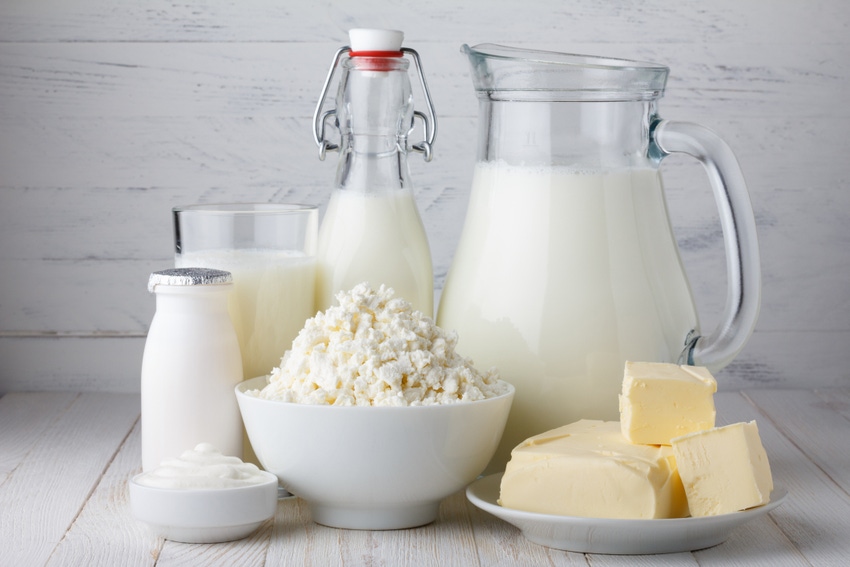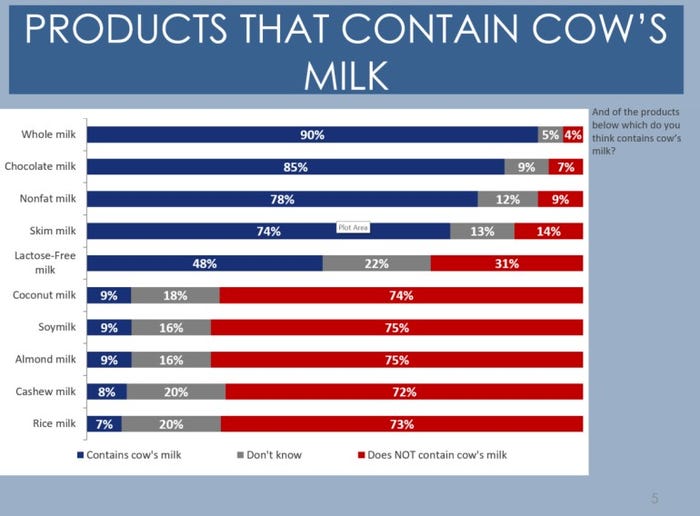Fewer than 10% of consumers believe that coconut, soy, almond, cashew and rice milks contain cow’s milk.

On Thursday, the comment period closed for the U.S. Food & Drug Administration's consideration of a proposal “to provide greater clarity on appropriate labeling of plant-based alternatives” to milk and dairy products. A new survey by the International Food Information Council (IFIC) Foundation shows a low level of consumer confusion between the two.
Many dairy products, such as milk, yogurt and certain cheeses, have standards of identity established by regulation, which require certain components and ingredients in these foods. Names such as “milk,” “yogurt” and “cheddar cheese” have long been recognized by the American public as identifying the dairy foods described in the standards. More recently, these names have appeared in the labeling of plant-based products as part of the name of the product. Some examples include “soy milk,” “almond milk” and “vegan mozzarella cheese.”
These plant-based products are sometimes packaged very similarly to conventional milk or yogurt, for example, and are often sold in the dairy section of grocery stores. However, these plant-based products may not be satisfactory substitutes for all uses of dairy, and some may not be nutritionally equivalent, FDA Commissioner Scott Gottlieb said in a statement requesting comment on the use of dairy names for plant-based substitutes.
According to the IFIC survey, a significant majority of people understand correctly which products contain or do not contain milk from cows when shopping for various types of products labeled using the word “milk.”
About three-quarters of Americans understand that plant-based “milk” products do not actually contain cow’s milk (75% for soy milk and almond milk, 74% for coconut milk, 73% for rice milk and 72% for cashew milk). Fewer than 10% believe that any of those products contains cow’s milk, while the remainder say they don’t know (20% for cashew milk and rice milk, 18% for coconut milk and 16% for soy milk and almond milk).

Conversely, large majorities know that products labeled as “whole milk” (90%), “chocolate milk” (85%), “nonfat milk” (78%) and “skim milk” (74%) contain cow’s milk, although that number falls to 48% for “lactose-free milk.”
Consumers expressed similar awareness about whether various products labeled as milk or butter contained cow’s milk or plant-based ingredients. Cow’s milk was identified as an ingredient in chocolate milk by 84% of respondents, in organic milk by 78% and in butter by 77%, with only 8% or less believing that any of those products contains plant-based ingredients. For lactose-free milk, 62% believe it contains cow’s milk, and 14% think it has plant-based ingredients.
The survey also asked about consumers’ purchases in the past three months. Nearly half (45%) bought 2% milk, 38% bought whole milk, 30% bought almond milk, 29% bought chocolate milk, 19% bought 1% milk, 16% bought both skim milk and soy milk and less than 10% bought lactose-free milk or other nut- or grain-based milks.
Of those who bought products marketed as milk, 62% purchased solely dairy, while 38% purchased non-dairy products. Groups who are more likely than others to buy non-dairy products include people living in the western U.S. (45%), consumers under 45 years old (43%), people of color (48%, compared to 32% of white people) and those with a college education (44%, compared to 30% for those with no college degree).
About the Author(s)
You May Also Like





